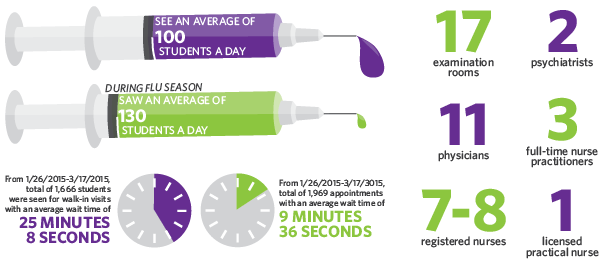
From flu symptoms to allergies to more serious diseases, students turn to the Decker Student Health Services Center for immediate attention.
Decker is certified by the Accreditation Association for Ambulatory Health Care, an organization that annually evaluates health centers’ treatment procedures. It provides primary, chronic, sexual and psychiatric treatment, as well as health education and vaccinations to BU students. These services are covered by the mandatory health fee, which totaled $181 for students enrolled in 12 or more credits for the 2014-15 school year.
While the center is open from 8 a.m. to 11 a.m. for walk-ins and 1 p.m. to 3:45 p.m. for appointments, Decker refers students to local hospitals for after-hours or emergency treatment.
According to Johann Fiore-Conte, the director of health and counseling services, because Decker is on campus, its staff specializes in working with college-aged patients.
“Our goal is that we can interface with off-campus and on-campus folks so that we can assist the students,” she said.
Many students say their concerns about the health center stem from the availability of walk-in hours. Julian Madera, an undeclared freshman, said that although he appreciated the services he received, he did not enjoy the wait times.
“I don’t like how walk-ins stop at 11 a.m.,” Madera said. “If you start getting sick one afternoon you have to wait until the next day to be treated.”
According to Fiore-Conte, Decker used to operate entirely on a walk-in basis. But because they could not control the flow of student arrival times, she said, many complained that the waits were too long. To remedy this, the system of morning walk-ins and afternoon appointments was put in place about four years ago.
“At about 10 in the morning it got really busy here,” she said. “And that busyness just continued throughout the day. That meant that if you came in here around two in the afternoon, you were at the mercy of whoever came ahead of you. The wait times were really long, and students weren’t happy with that.”
Melissa Neira, a senior majoring in English, lives off campus and said that the early morning walk-in hours are difficult for a student who is feeling ill.
Neira recalled an incident where she went to Decker to get tested for strep throat and was told that the results were negative. However, when she got back home she received a call and was told that her results had been misread and that she needed to return to get antibiotics.
“It’s a big deal for me to get to and from campus just to go to the doctor at 8:30 a.m.,” she said. “I was feeling so sick the whole time.”
However, for Brandon Hohenberg, a sophomore double-majoring in accounting and business administration, Decker was helpful after he contracted chicken pox and could not go home.
“When something really serious comes up, they are more than accommodating for your schedule,” he said. “When I had a situation such as getting chicken pox my freshman year, they were more than supportive in contacting the right people and accommodating me on campus. They let me remain in isolation on campus for five days, which was fantastic.”
Fiore-Conte said the Student Health Advisory Committee discusses health issues brought to them by students every few weeks, and explores how Health Services can respond. In addition, she said, she wants to encourage students to come with their questions about the services.
“They can join us,” Fiore-Conte said. “When there are complaints, we certainly encourage and want students to bring concerns forward. We almost constantly look at our services and how to improve.”


